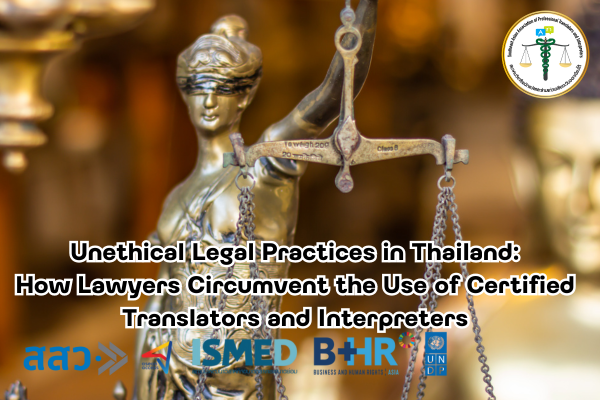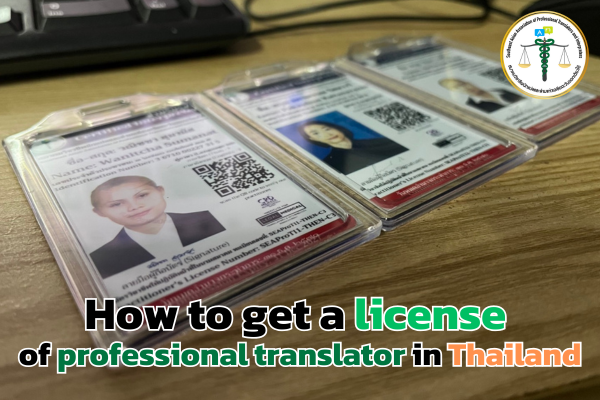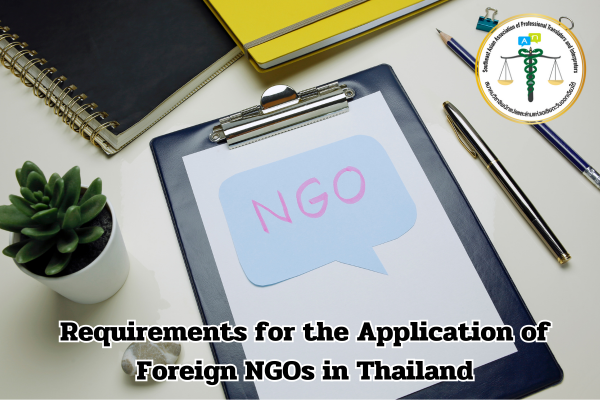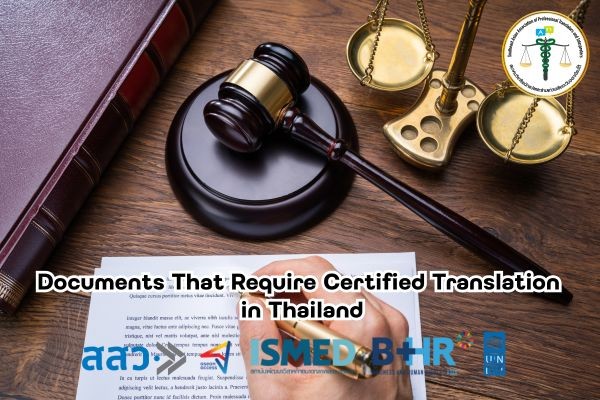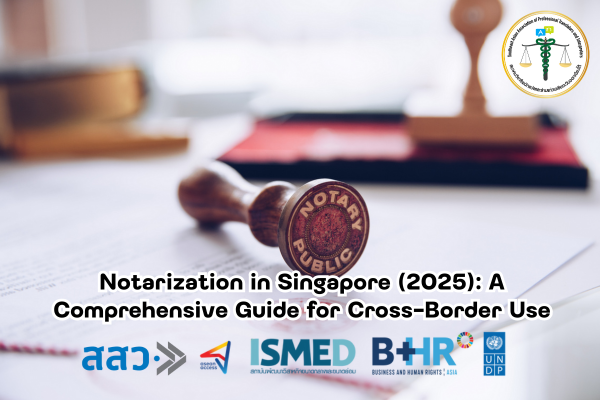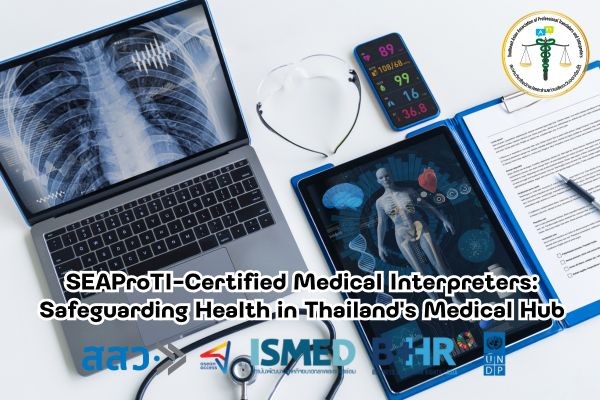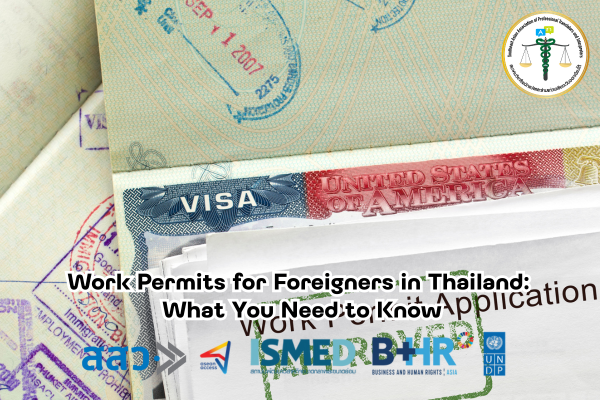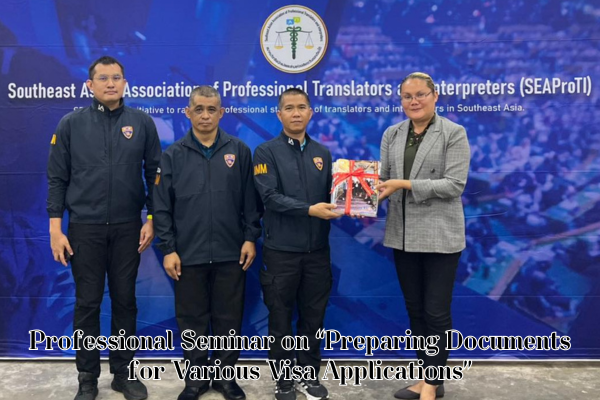Unethical Legal Practices in Thailand:
How Lawyers Circumvent the Use of Certified Translators and Interpreters
14 April 2025, Bangkok – In today’s legal landscape, cross-linguistic communication is vital in ensuring fairness and clarity in judicial proceedings. Certified Translators, Translation Certification Providers, and Certified Interpreters are indispensable in upholding justice, accuracy, and due process.
In Thailand, although there is no specific legislation that mandates the use of certified language professionals in court proceedings, there is only one officially recognized body authorized to issue professional licenses for certified translators and interpreters: the Southeast Asian Association of Professional Translators and Interpreters (SEAProTI).
However, the lack of legal obligation has created a loophole that allows some lawyers to exploit the system by engaging uncertified interpreters or conducting translations themselves. These individuals often lack ethical standards, training, and compliance with international norms, ultimately serving the interests of their clients rather than justice. This paper explores how such practices distort legal proceedings and damage the integrity of the Thai justice system.
Common Tactics Employed by Lawyers to Avoid Certified Language Professionals
1. Self-Translation with Biased Interpretations
Some lawyers choose to translate legal documents themselves, deliberately altering wording to benefit their client’s case. For example, a witness statement saying “I own this land” may be translated as “My name is on the land document,” which introduces ambiguity and may delay proceedings by requiring additional evidence from the court. This tactic is used to stretch out the trial or to cast doubt strategically.
2. Using Witnesses to Falsely Certify Translations
In these instances, lawyers have their witnesses sign off on translations, even though they were not the ones who translated the content. This is intended to mislead the court and hide the fact that the translation was performed by the lawyer.
3. Acting as Both Lawyer and Interpreter in Court
Some lawyers go a step further by requesting to serve as the interpreter during trial sessions. Their real intention is to reinforce their biased translation in court, under the guise of interpretation, without any scrutiny or ethical oversight from a professional body.
4. Certifying Translations Through Conflicted Parties
In many cases, lawyers themselves notarize the signatures of so-called translators—who are their witnesses—on documents they translated. These actions raise serious ethical concerns and create the appearance of false impartiality.
Impacts on the Justice System
These practices, though not explicitly illegal under current Thai law, undermine the integrity of legal proceedings in the following ways:
- Erode transparency in trial processes
- Enable manipulation of evidence and testimony
- Reduce public trust in the fairness of the judicial system
- Damage Thailand’s international reputation, particularly in cross-border litigation
- Violate human rights principles, particularly the right to a fair trial and equal access to justice
Policy Recommendations
To prevent unethical legal conduct and to uphold the rule of law, the following steps are recommended:
- Enact regulations requiring that legal translations and interpretations be conducted only by certified professionals
- Mandate cooperation between courts and recognized professional bodies to maintain national registries of accredited translators and interpreters
- Educate the public and legal professionals on the role of certified language providers to prevent misinformation and malpractice
- Enforce disciplinary measures against lawyers who manipulate the system through deceptive language practices
Conclusion
Although the legal framework in Thailand does not currently impose strict requirements on the use of certified translators and interpreters, failure to uphold professional standards in linguistic services poses a serious threat to judicial integrity. Certified language professionals are not merely conveyors of words; they are guardians of justice. Their role is indispensable in ensuring fairness, neutrality, and trust in modern legal systems.
SEAProTI’s certified translators, translation certification providers, and certified interpreters:
The Southeast Asian Association of Professional Translators and Interpreters (SEAProTI) has officially announced the criteria and qualifications for individuals to register as “Certified Translators,” “Translation Certification Providers,” and “Certified Interpreters” under the association’s regulations. These guidelines are detailed in Sections 9 and 10 of the Royal Thai Government Gazette, issued by the Secretariat of the Cabinet under the Office of the Prime Minister of the Kingdom of Thailand, dated July 25, 2024, Volume 141, Part 66 Ng, Page 100.
เทคนิคของทนายความที่ไม่ชอบด้วยกฎหมาย: ความเสี่ยงต่อกระบวนการยุติธรรมเมื่อไม่ใช้นักแปลและล่ามรับรอง
14 เมษายน 2568, กรุงเทพมหานคร – ในโลกยุคปัจจุบันที่การสื่อสารข้ามภาษาเป็นสิ่งหลีกเลี่ยงไม่ได้ โดยเฉพาะในบริบทของกระบวนการยุติธรรม การใช้ นักแปลรับรอง (Certified Translators), ผู้รับรองการแปล (Translation Certification Providers) และ ล่ามรับรอง (Certified Interpreters) จึงมีบทบาทสำคัญยิ่งต่อการประกันความเป็นธรรมและความถูกต้องของข้อมูลในคดีความ
ในประเทศไทย แม้ยังไม่มีกฎหมายเฉพาะที่ บังคับ ให้ใช้ผู้เชี่ยวชาญด้านภาษาเหล่านี้โดยตรง แต่ก็มีเพียงแหล่งเดียวเท่านั้นที่สามารถออกใบอนุญาตประกอบวิชาชีพในนามนักแปลและล่ามรับรองได้อย่างเป็นทางการ ได้แก่ สมาคมวิชาชีพนักแปลและล่ามแห่งเอเชียตะวันออกเฉียงใต้ (SEAProTI) ซึ่งได้จัดตั้งระบบรับรองขึ้นเพื่อสร้างมาตรฐานจริยธรรม ความเป็นกลาง และคุณภาพในวิชาชีพอย่างแท้จริง
อย่างไรก็ตาม ช่องว่างของกฎหมายในปัจจุบันเปิดโอกาสให้ทนายความบางรายใช้กลยุทธ์ทางภาษาอย่างไม่ชอบธรรม เพื่อประโยชน์ฝ่ายเดียวของลูกความโดยไม่คำนึงถึงความยุติธรรมในภาพรวม ซึ่งพฤติกรรมดังกล่าวมีแนวโน้มเพิ่มขึ้น และอาจส่งผลกระทบอย่างร้ายแรงต่อความน่าเชื่อถือของกระบวนการยุติธรรมไทยในเวทีสากล
เทคนิคที่พบทนายความบางรายใช้ในการหลีกเลี่ยงการใช้ผู้เชี่ยวชาญรับรอง
1. การแปลเอกสารเองโดยไม่มีมาตรฐานหรือการรับรอง
ทนายความบางรายเลือกแปลเอกสารด้วยตนเองและปรับเปลี่ยนถ้อยคำให้เป็นไปในทางที่เอื้อประโยชน์แก่ลูกความ เช่น การแปลข้อความ “I own this land” เป็น “ฉันมีชื่อในเอกสารที่ดินนี้” ซึ่งเปลี่ยนจากคำพูดที่สื่อถึง กรรมสิทธิ์ในเชิงนิติกรรม ให้กลายเป็นเพียง การมีชื่อในเอกสาร ซึ่งอาจเปิดช่องให้เกิดข้อพิพาทหรือความสับสนทางข้อเท็จจริง และเป็นการยื้อเวลาให้คดียืดเยื้อโดยไม่จำเป็น
2. การให้พยานลงชื่อรับรองการแปล โดยไม่ได้เป็นผู้แปลเอง
กรณีนี้พยานของฝ่ายทนายความจะถูกขอให้ลงชื่อรับรองการแปล ทั้งที่ไม่ใช่ผู้แปลเอกสารด้วยตนเองจริง ๆ เพื่อให้ดูเหมือนว่าไม่ได้มีการแปลโดยทนายความ และหลีกเลี่ยงการตรวจสอบจากศาล
3. การให้ทนายขึ้นศาลทำหน้าที่ล่ามด้วยตนเอง
ทนายบางรายที่แปลเอกสารด้วยตนเอง จะขอทำหน้าที่เป็นล่ามในห้องพิจารณาคดีด้วย โดยอ้างว่าเพื่อความเข้าใจของพยาน แต่ในความเป็นจริงแล้วคือการย้ำความหมายที่ตัวเองเคยแปลไว้ ว่า “ถูกต้อง” ทั้งที่ไม่ได้ผ่านมาตรฐานวิชาชีพ หรือการควบคุมทางจริยธรรมของสมาคมวิชาชีพใด ๆ
4. การรับรองลายมือชื่อผู้แปลโดยผู้มีส่วนได้เสียในคดี
ในหลายกรณี ทนายความเป็นผู้รับรองลายมือชื่อของ “ผู้แปล” ที่แท้จริงแล้วคือพยานของตนเอง และมิได้เป็นผู้แปลจริง นี่เป็นการกระทำที่ส่อเจตนาในการบิดเบือนข้อเท็จจริงของเอกสาร และอาจเข้าข่ายการหลอกลวงศาล
ผลกระทบต่อกระบวนการยุติธรรมไทย
การกระทำข้างต้นของทนายความบางรายไม่เพียงเป็นการบั่นทอนหลักความยุติธรรม หากแต่ยังมีผลกระทบในระดับโครงสร้าง ได้แก่:
- ทำให้กระบวนการพิจารณาคดีขาดความโปร่งใส
- เปิดช่องให้มีการบิดเบือนข้อมูลและหลักฐาน
- ลดทอนความเชื่อมั่นของประชาชนต่อระบบศาล
- ทำลายภาพลักษณ์ของประเทศไทยในเวทีนานาชาติ โดยเฉพาะในคดีระหว่างประเทศ
- ขัดต่อหลักสิทธิมนุษยชนว่าด้วยการเข้าถึงกระบวนการยุติธรรมอย่างเป็นธรรมและเท่าเทียม
ข้อเสนอแนะเชิงนโยบาย
เพื่อป้องกันการใช้เทคนิคทางภาษาโดยไม่ชอบธรรมในคดีความ ควรมีแนวทางที่ชัดเจนจากภาครัฐและวิชาชีพ ดังนี้:
- บัญญัติกฎหมายหรือระเบียบศาลที่กำหนดให้การแปลเอกสารหรือการใช้ล่ามในกระบวนการยุติธรรมต้องมาจากผู้ที่มีใบรับรองจากหน่วยงานที่ได้รับการรับรองในระดับประเทศ
- ส่งเสริมให้ศาลและหน่วยงานยุติธรรมร่วมมือกับสมาคมวิชาชีพในการอบรม ตรวจสอบ และจัดตั้งทะเบียนผู้เชี่ยวชาญด้านภาษา
- ประชาสัมพันธ์ให้ประชาชนเข้าใจบทบาทของนักแปลและล่ามรับรอง เพื่อป้องกันการถูกหลอกใช้บริการที่ไม่มีมาตรฐาน
- พิจารณาโทษทางจริยธรรมและวินัยสำหรับทนายความที่จงใจบิดเบือนกระบวนการโดยไม่ใช้ผู้เชี่ยวชาญที่ได้รับการรับรอง
บทสรุป
แม้ข้อบังคับทางกฎหมายในปัจจุบันยังไม่เข้มงวดต่อการใช้บริการแปลและล่ามรับรองในคดีความ แต่การเพิกเฉยต่อมาตรฐานวิชาชีพด้านภาษาสามารถนำไปสู่ความเสื่อมถอยของกระบวนการยุติธรรมในภาพรวม บทบาทของนักแปลและล่ามรับรองจึงมิใช่เพียงผู้ถ่ายทอดภาษา แต่คือ “ผู้ค้ำจุนความยุติธรรม” ที่มีความสำคัญยิ่งในระบบกฎหมายยุคใหม่
เกี่ยวกับนักแปลรับรอง ผู้รับรองการแปล และล่ามรับรองของสมาคมวิชาชีพนักแปลและล่ามแห่งเอเชียตะวันออกเฉียงใต้
สมาคมวิชาชีพนักแปลและล่ามแห่งเอเชียตะวันออกเฉียงใต้ (SEAProTI) ได้ประกาศหลักเกณฑ์และคุณสมบัติผู้ที่ขึ้นทะเบียนเป็น “นักแปลรับรอง (Certified Translators) และผู้รับรองการแปล (Translation Certification Providers) และล่ามรับรอง (Certified Interpreters)” ของสมาคม หมวดที่ 9 และหมวดที่ 10 ในราชกิจจานุเบกษา ของสำนักเลขาธิการคณะรัฐมนตรี ในสำนักนายกรัฐมนตรี แห่งราชอาณาจักรไทย ลงวันที่ 25 ก.ค. 2567 เล่มที่ 141 ตอนที่ 66 ง หน้า 100 อ่านฉบับเต็มได้ที่: นักแปลรับรอง ผู้รับรองการแปล และล่ามรับรอง


